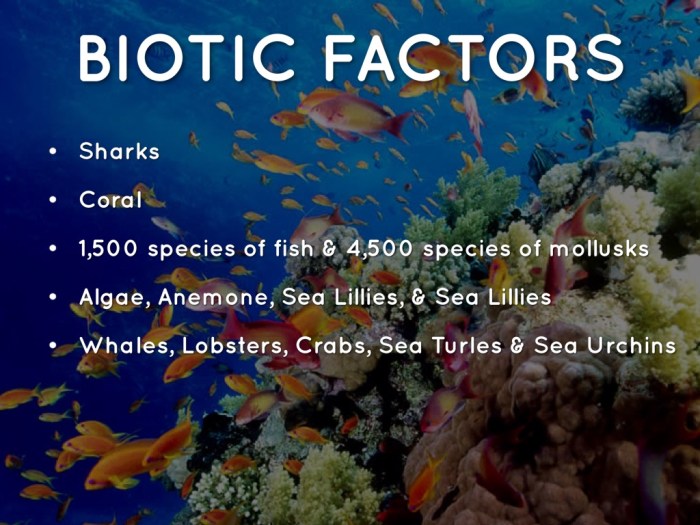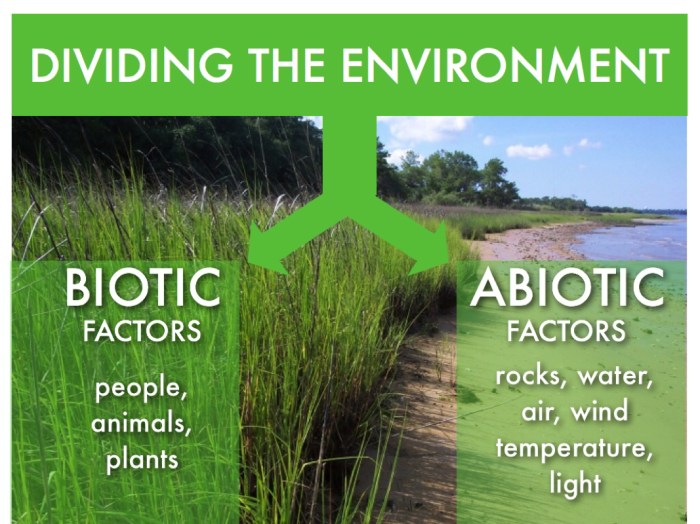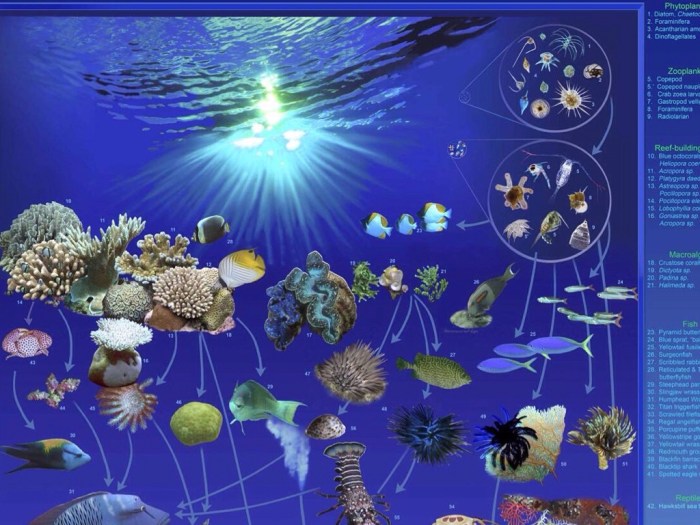As coral reefs 2 biotic factors takes center stage, this opening passage beckons readers into a world crafted with good knowledge, ensuring a reading experience that is both absorbing and distinctly original. From the vibrant tapestry of coral species to the myriad of fish and invertebrates that call these underwater havens home, we delve into the intricate relationships that define the very essence of coral reef ecosystems.
The content of the second paragraph that provides descriptive and clear information about the topic
Biotic Factors in Coral Reef Ecosystems

Within ecological communities, biotic factors encompass the living organisms and their interactions, shaping the structure and dynamics of the ecosystem. In coral reef ecosystems, a diverse array of biotic factors plays crucial roles in maintaining the health and resilience of these vibrant underwater habitats.
Key biotic factors found in coral reef ecosystems include:
- Corals:The reef-building corals, primarily stony corals, form the foundation of the ecosystem, providing shelter and habitat for countless other species.
- Fish:A vast diversity of fish species inhabit coral reefs, fulfilling various ecological roles such as herbivores, predators, and cleaners.
- Invertebrates:A myriad of invertebrates, including mollusks, crustaceans, and echinoderms, contribute to the ecosystem’s biodiversity and ecological balance.
- Algae:Both macroalgae (seaweeds) and microscopic algae (phytoplankton) play significant roles in nutrient cycling and energy flow within the reef.
- Bacteria and Fungi:Microbial communities, including bacteria and fungi, perform essential functions such as nutrient decomposition and disease regulation.
Interactions between Biotic Factors
The interactions between different biotic factors within the reef community are complex and interconnected. For instance, corals rely on symbiotic algae for photosynthesis, while fish and invertebrates feed on the algae that grow on the coral surface. Herbivorous fish control the growth of algae, preventing it from smothering the corals.
Cleaner fish remove parasites and dead tissue from larger fish, maintaining their health. These intricate relationships contribute to the overall balance and resilience of the coral reef ecosystem.
In exploring the intricate web of life that coral reefs support, we must consider the interplay of biotic factors. These factors include the relationships between organisms, such as competition and predation. Incidentally, if you’re interested in expanding your vocabulary, you might want to check out palabras con za ze zi zo zu to learn some Spanish words starting with those syllables.
Returning to our topic, these biotic interactions shape the abundance and distribution of species within coral reef ecosystems, ultimately influencing their overall health and resilience.
Importance of Coral Reef Biotic Factors: Coral Reefs 2 Biotic Factors

Biotic factors play a crucial role in maintaining the vibrant biodiversity and resilience of coral reefs. These factors, including interactions between organisms, determine the health and functioning of the entire ecosystem.
One vital role of biotic factors is their contribution to the food web. Coral reefs support a diverse array of organisms, from microscopic plankton to large predators like sharks and whales. These organisms rely on each other for sustenance, creating complex food chains and webs that maintain the balance of the ecosystem.
Disrupting these interactions, such as overfishing or introducing invasive species, can have cascading effects on the entire reef.
Symbiotic Relationships
Symbiotic relationships are particularly important in coral reefs. One notable example is the mutualistic relationship between corals and photosynthetic algae called zooxanthellae. These algae provide the corals with essential nutrients through photosynthesis, while the corals provide the algae with protection and a stable environment.
This symbiosis is vital for the survival and growth of corals, forming the foundation of the reef ecosystem.
Anthropogenic Impacts on Biotic Factors

Human activities have a significant impact on the biotic factors of coral reef ecosystems. These activities include overfishing, pollution, and climate change.
Overfishing can lead to a decline in the abundance of fish and other marine organisms, which can disrupt the food chain and ecosystem balance. Pollution, such as nutrient runoff and oil spills, can harm coral reefs and the organisms that live in them.
Climate change is causing ocean temperatures to rise, which can lead to coral bleaching and death.
Strategies for Mitigating Human Impacts, Coral reefs 2 biotic factors
There are a number of strategies that can be used to mitigate human impacts on coral reef ecosystems. These include:
- Reducing overfishing through sustainable fishing practices
- Controlling pollution through wastewater treatment and stormwater management
- Reducing greenhouse gas emissions to mitigate climate change
- Establishing marine protected areas to provide a safe haven for coral reefs and the organisms that live in them
Conservation and Management of Coral Reef Biotic Factors

Maintaining the health and resilience of coral reef ecosystems requires the conservation and management of their intricate biotic components. Human activities, such as overfishing, pollution, and climate change, pose significant threats to these vital organisms.
Conservation efforts prioritize the protection of coral reef communities by establishing marine protected areas (MPAs), implementing sustainable fishing practices, and reducing pollution. These measures aim to safeguard the abundance and diversity of reef-building corals, fish species, and other symbiotic organisms.
Challenges and Opportunities for Biotic Factor Conservation
Despite ongoing conservation efforts, coral reef ecosystems face numerous challenges:
- Climate Change:Rising sea temperatures and ocean acidification threaten the survival and growth of corals.
- Overfishing:Excessive fishing can deplete fish populations, disrupting the ecological balance and reducing the food sources for other organisms.
- Pollution:Coastal development, sewage discharge, and agricultural runoff contribute to water pollution, harming coral reefs and associated marine life.
To enhance the conservation of biotic factors in coral reefs, opportunities exist in:
- Expanding MPAs:Increasing the size and number of marine protected areas can provide safe havens for coral reef communities.
- Implementing Sustainable Fishing Practices:Establishing catch limits, gear restrictions, and closed seasons can prevent overfishing and allow fish populations to recover.
- Reducing Pollution:Implementing stricter regulations, promoting sustainable agriculture practices, and improving wastewater treatment can reduce the impact of pollution on coral reefs.
- Research and Monitoring:Ongoing research and monitoring programs help scientists understand the threats facing coral reefs and develop effective conservation strategies.
- Education and Awareness:Raising awareness about the importance of coral reefs and promoting responsible practices can foster public support for conservation efforts.
Question Bank
What are biotic factors in coral reef ecosystems?
Biotic factors in coral reef ecosystems encompass all living organisms, from microscopic algae to majestic sea turtles, that interact and shape the reef community.
How do biotic factors contribute to coral reef biodiversity?
Biotic factors play a crucial role in maintaining coral reef biodiversity by providing food, shelter, and breeding grounds for a vast array of marine life.
What are the potential consequences of disrupting biotic interactions within the reef ecosystem?
Disrupting biotic interactions can lead to imbalances in the ecosystem, reduced biodiversity, and ultimately the decline of coral reefs.
What are some strategies for mitigating human impacts on biotic factors in coral reefs?
Strategies for mitigating human impacts include reducing overfishing, controlling pollution, and addressing climate change.
Why is it important to conserve and manage biotic factors for coral reef health?
Conserving and managing biotic factors is essential for maintaining the health and resilience of coral reefs, ensuring their continued existence as vibrant and biodiverse ecosystems.